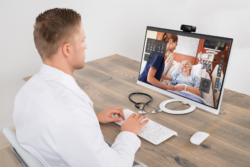According to Yorktel’s Pete McLain, video must be simple, robust and effective to make video work in telemedicine. Video conferencing must be accessible on demand to deliver telehealth. In this podcast, McLain, who is Yorktel’s Senior Vice President of Health, says it’s the 3am video conference call that represents the critical test of video conferencing in a healthcare setting.
Stroke, and other health care emergencies don’t come to arrive for a scheduled conference call. In this podcast, McLain explains that it’s at 3am, when the on-site medical team is fighting to save a life, that video conferencing solutions are tested. If they are easy to use, accessible, and dependably operational, the team will use the resource to link to a larger center where additional expertise can be found. If the system has already demonstrated poor reliability or of the onsite staff cannot easily get it to function, people will simply skip the available video conferencing system and move on to other options.
McLain reports on Yorktel’s Univago HE healthcare and how Yorktel is making an impact on the health care landscape. We learn about how telehealth can help with diagnosis, treatment and we learn about telestroke. Telestroke helps bridge the critical ninety-minute period where significant brain damage can be avoided. We learn about Yorktel’s experience in video conferencing and their approach to telemedicine.
Listen Here:
